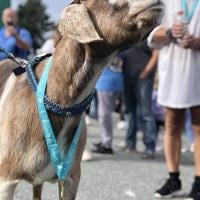CONCEPTION BAY SOUTH, N.L. – He may not have logged the fastest time or even gone the full distance, but residents of a Newfoundland town agree the goat who unexpectedly joined the local weekend half marathon was the event’s undisputed champion.
Partway through Sunday’s T’Railway Trek half marathon in Conception Bay South, N.L., an eager 68-kilogram (150 pound) goat named Joshua broke free from his collar and joined the runners on the route.
He kept pace for nearly a quarter of the race before being rounded up by his owners and now even has a medal to show for his efforts.
Joshua’s half-marathon debut surprised no one more than Heidi Taylor, who woke up Sunday morning to find social media awash in photos of her goat mingling with fellow runners.
“We take Joshua for walks, he listens very well and will follow you,” she said in an interview Sunday.
“So when he’s seeing all the people running, he must have thought: ‘I’m going to go too.’”
Joshua lives at Taylor’s Pumpkin Patch, the business Heidi Taylor co-owns. Taylor doesn’t know what time he managed to ditch his collar but estimates he ran about five kilometres of the 21-kilometre race.
She got wind of his unexpected participation at around 9:30 when she opened her Facebook and recognized him from the photos filling her feed.
Taylor and her fiancé used the Facebook posts to figure out Joshua’s whereabouts along the race route, and they “took another collar and leash along with a bag of cheezies” —his favourite snack — and went off to find him.
Joshua stuck close with the crowd of runners, Taylor said, and managed to avoid roads and stay on a trail. The runners “kept him going, he would follow whoever he was running after.”
“At one point he was leading the race,” Taylor said with a laugh.
Once she managed to collect Joshua, Taylor brought him down to the finish line so he could celebrate with his new running friends.
That’s where Joshua was awarded his half marathon medal. Jeanine Scott, a race volunteer, was the one who placed it around Joshua’s neck.
“I figured you know what, you don’t always see a goat at the finish line of a half marathon, so Joshua got the medal and he was sporting it quite well,” Scott said.
While Joshua’s escape came as a bit of a shock, Taylor said she’s not surprised her people-loving goat wanted to join in the fun. She said he loves to be with people and can often be found sneaking popcorn and snuggles from visitors at the pumpkin patch.
“When we close the farm to the public in October, we encourage people to keep coming back just to see him for a visit with their kids because he’s just such a loveable animal,” she said.
The town of Conception Bay South posted about the “un-baa-lievable” moment when Joshua joined in the race, bringing smiles and giggles to runners and race volunteers. The post garnered over a thousand likes and shares with dozens of comments in just a few hours.
“That would make my day to run with a goat! I wouldn’t even be upset if he was faster than me, which he would be,” one commenter wrote.
“Well deserved medal for the GOAT,” wrote another.
The 10-year-old goat is now happily resting, exhausted from his big run, Taylor said.
This report by The Canadian Press was first published Sept. 30, 2024.
— By Lyndsay Armstrong in Halifax.
